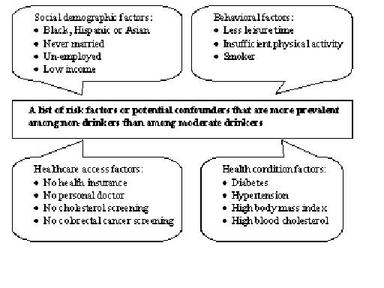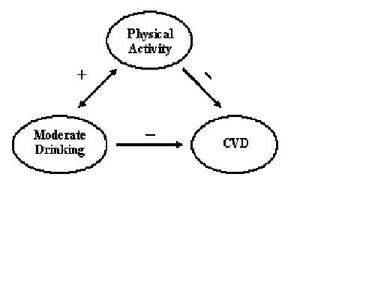The DRAM, Vol. 1(5) – Sober on the issue of the cardiovascular benefits of moderate drinking
Scientists have argued that moderate involvement with what some might perceive to be “sinful” behaviors, such as eating chocolate, might provide individuals some health benefits. Similarly, some have argued that drinking alcohol moderately provides protection against cardiovascular disease (CVD). After an original period of skeptism, many people and the media have accepted such possibilities with enthusiasm. However, a recent study (Naimi, Brown et al. 2005) suggests that the improved cardiovascular health of moderate drinkers compared to non-drinkers might be the result of better social, behavioral and health conditions rather than moderate alcohol consumption. In this issue of the DRAM, we review that study and the factors that might confound the perceived relationship between moderate drinking and risk of CVD.
Naimi, Brown et al. examined data from 2003 Behavioral Risk Factor Surveillance System, a nation-wide populationbased telephone survey of US adults. They compared the prevalence of CVD risk factors and other potential confounders of CVD health among large samples of moderate drinkers (n = 118,889) and nondrinkers (n = 116,841). The risk factors of CVD included age, sex, race and ethnicity, smoking status, high blood cholesterol, high blood pressure, physical inactivity, body mass index, and diabetes. The study also included potential confounders, such as social factors (e.g., social economic status), behavioral factors (e.g., vegetable consumption), healthcare access and other health conditions.
Figure 1 summarizes factors that tend to be more prevalent among non-drinkers than moderate drinkers. For example, the study found that, compared to moderate drinkers, non-drinkers tend to have less leisure time, insufficient physical activity and they tend to be smokers. The study found that nondrinkers as a group had less healthy measures on 27 of the 30 CVD-related risk factors or confounders.
Figure 1. Drinking and depression outcome measures (adapted from Moak et al., 2003). Click image to enlarge.
In this study, Naimi et al. examined the confounding that results from differences between the non-drinkers and moderate drinkers on characteristics known to influence the outcome measure (CVD). Figure 2 illustrates the relationships among physical activity, moderate drinking and the risk of CVD. In this study, moderate drinkers are associated with a healthy amount of physical exercise, as compared to non-drinkers. We know that a healthy amount of physical activity can reduce the risk of CVD, as indicated by the negative associated between physical activity and CVD. Assuming moderate drinkers also had lower risk of CVD and that physical activity might not be an intermediate variable in the path between moderate drinking and CVD, it is unclear whether the reduced risk of CVD should be attributable to physical activity or to moderate drinking. In the absence of control for physical activity, the apparent beneficial relationship between moderate drinking and risk of CVD can be misleading.
Figure 2. Click image to enlarge.
The moderate drinking recommendation suggested by the U.S. Department of Agriculture and the U.S. Department of Health and Human Services (U.S. Department of Agriculture & U.S. Department of Health and Human Services, 1990) limits alcohol consumption to no more than two drinks per day for men and one drink per day for women; this recommendation should be cautiously promoted regarding its benefits of CVD. The results of this study suggest that clinicians and policy makers avoid undue efforts to either promote or curb alcohol consumption as a function of its capacity to influence the risk of CVD. Naimi et al. recommend that future investigations seek to control potential confounding variables through the use of randomized trials. Furthermore, they suggest that due to relatively small beneficial effect of moderate drinking as compared to the mortality and morbidity that excessive drinking can cause, caution is called for when disseminating to the public the notion that moderate drinking has health benefits.
What do you think? Please use the comment link below to provide feedback on this article.
References
Naimi, T. S., D. W. Brown, et al.. (2005). Cardiovascular risk factors and confounders among nondrinking and moderate-drinking U.S. adults. American Journal of Preventive Medicine, 28, 369-373.
U.S. Department of Agriculture & U.S. Department of Health and Human Services (1990). Home and Garden Bulletin No. 232. Nutrition and Your Health: Dietary Guidelines for Americans. 3d ed. Washington, DC, Supt. of Docs., U.S. Government Printing Office.

